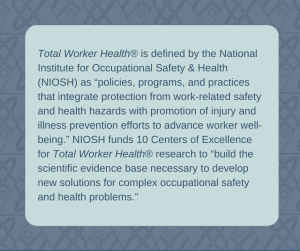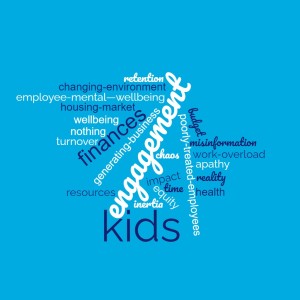By: Karen Moseley, HERO President & CEO
Last month, I was invited to attend the Southeastern Summit of The Carolina Center, one of the newest Centers of Excellence funded by NIOSH. I love to travel to new places, but it’s also nice when a short drive is all that’s needed. That was the case in December at The Rizzo Center in Chapel Hill, NC. A few key takeaways:
- Casey Chosewood, Director of the Office for Total Worker Health®, NIOSH, emphasized the national business imperative to grow health as part of the work experience with the 3 P’s (policies, programs, practices) to achieve generational impact.
- Alice Ammerman, Director of the UNC Center for Health Promotion and Disease Prevention, is targeting small and midsize businesses (SMBs) with a new project that retrofits worksite ice cream machines for healthy frozen meals. Revolutionary!
- Michael, a SMB leader, identified challenges he’s facing (along his workforce) with work-life boundaries and how to cultivate a healthy work culture for virtual employees.
- North Carolina, my home state, is ranked near the bottom in “The Best and Worst States to Work in America” for worker protection (#35) and overall (#47). Appalling!
Just last week, my commute was even shorter – up two flights of stairs to my home office – to attend the first-ever HERO Small and Midsize Business (SMB) Summit. We highlighted inspiring examples of how employers are flipping the narrative: small organizations with seemingly more barriers (e.g., limited financial and human resources) are very well positioned to maximize the leadership and organizational support best practices that have been linked to lower medical cost and higher productivity.
 Attendees shared what keeps them up at night, and some of the shared themes included engagement, kids (how’s your employer caregiving policy?), and finances (both budget and financial well-being).
Attendees shared what keeps them up at night, and some of the shared themes included engagement, kids (how’s your employer caregiving policy?), and finances (both budget and financial well-being).- Leaders from American Cast Iron Pipe Company, Hollingsworth, Union Bank & Trust, Andersen Construction, and Southern Farm Bureau Life Insurance Company emphasized the importance of culture and leadership, people and policies, intentional and sustained focus, and flexibility.
- Expert presenters, Haley Potoczek, MBA; Jessica Grossmeier, PhD; and, Laura Linnan, ScD, presented data linking leadership to successful health and well-being efforts, as well as the integration of safety. [Reference: Springbuk’s Healthiest Employers Program, the HERO Health and Well-being Best Practices Scorecard in Collaboration with Mercer© (HERO Scorecard), and the Workplace Health in America survey]
Next month, the HERO Winter Think Tank will take place at The Rizzo Center on the theme, “Total Worker Health®: Getting Further Upstream in the Integration of Safety, Well-being and Mental Health”. We’ll be joined by experts like Dr. Linnan, and hear integration stories from organizations like AVANGRID, Chevron, Cincinnati Children’s Hospital, HCA Healthcare, Shell Oil, and the University of Virginia.
This national conversation is happening in my own backyard, but it’s also happening on every Main Street in America. Small and midsize businesses (with fewer than 1,000 employees) make up more than 99% of businesses in the U.S. For that reason, they must be at the table when we talk about connecting science to practice in order to demonstrate the value of a health and well-being employer ecosystem. The challenge for HERO and other organizations committed to workforce health and well-being is identifying the evidence of application in the small and midsize workforce.
This momentum is building toward the exciting potential for the future health and well-being of ALL workers. HERO and NIOSH have partnered to create a clearinghouse to collect feedback from employees via the NIOSH Worker Well-Being Questionnaire (WellBQ) about perceptions of quality of work life, circumstances outside of work, supervisor support, and physical and mental health status. This will facilitate future research linking the employee experience and best practices reported in organizational scorecards, like the HERO Scorecard. Maybe we’re closer than we think to knocking out that hurdle of evidence-based practice for SMBs!
